philosophy final
1/58
There's no tags or description
Looks like no tags are added yet.
Name | Mastery | Learn | Test | Matching | Spaced |
|---|
No study sessions yet.
59 Terms
What is an argument in logic?
-It is an attempt to formulate reasons in support of one’s claims to convince others that these claims are true.
-An argument is a list of statements, one of which is the conclusion, and the others are the premises.
What is an example of an argument? (Premises & Conclusions)
-No one under 18 can vote. Therefore, Jim cannot vote because he is not yet 18.
-Premise 1: No one under 18 can vote.
-Premise 2: Jim is under 18.
-Conclusion: Jim cannot vote.
-Def, you should not get a long-haired cat. I have heard that cats with long hair have lots of fleas/ They also shed all over the house.
Premise 1: Cats with long hair have lots of fleas.
Premise 2: They also shed all over the house.
Conclusion: You should not get a long-haired cat.
What is an inductive argument?
-An argument that produces probable results.
-One whose premises are claimed to provide only some less-than-conclusive grounds for accepting the conclusion.
Types of inductive arguments:
-Moves from particular observations to general conclusions.
-Leads to probable conclusions, not necessary ones.
-Can be stronger or weaker depending on the degree of probability.
Facts to note about inductive arguments:
-They are mostly based upon experience and observation.
-Tend to lean more towards empirical arguments.
-General conclusions are drawn from particular instances of observations.
-The conclusion typically makes a leap beyond what is stated in the premises.
What is an deductive argument?
-Produces certain results
-An argument for which the premises are offered to provide logically conclusive support for its conclusion.
-An argument whose premises, if true, provide conclusive evidence for the truth of its conclusions.
Deductive examples:
-P1: All men are mortal
-P2: Socrates was a man
-C: Therefore, Socrates was mortal.
Facts to note about deductive arguments:
-Validity: One where the conclusion necessarily follows from the premises. Says nothing about whether or not any of the premises are true. More about the FORM of an argument, rather than the TRUTH of one.
-Invalid argument: One whose conclusion is not proven by its premises.
-Sound argument: If it is valid, its premises are true. A sound argument has the right form, and it is true
-Unsound argument: Opposite of a sound argument.
What are logical fallacies?:
-Logical fallacies are errors in reasoning that are based on poor or faulty logic.
-Logical fallacies are deceptive or false arguments that may seem stronger than they are due to psychological persuasion, but are proven wrong with reasoning and further examination.
Why are logical fallacies problematic?:
-People will often commit logical fallacies to trick/pressure others into believing that they have a good argument.
Common logical fallacies (12):
Strawman, Non sequitur, Ad Hominem, Appeal to authority (argumentum ad verecundiam), False analogy, Argumentum ad populum (bandwagon argument), Begging the question (Petiti principii), False dichotomy (“Either…or” fallacy), Hasty generalization, Reductio ad absurdum, Red herring, Argument from ignorance (argumentum ad ignorantiam)
Strawman Fallacy:
-Occurs when someone distorts their opponent's argument by oversimplifying or exaggerating it.
-EX: After Will said that we should put more money into health and education, Warren responded by saying that he was surprised that Will hates our country so much that he wants to leave it defenseless by cutting military spending.
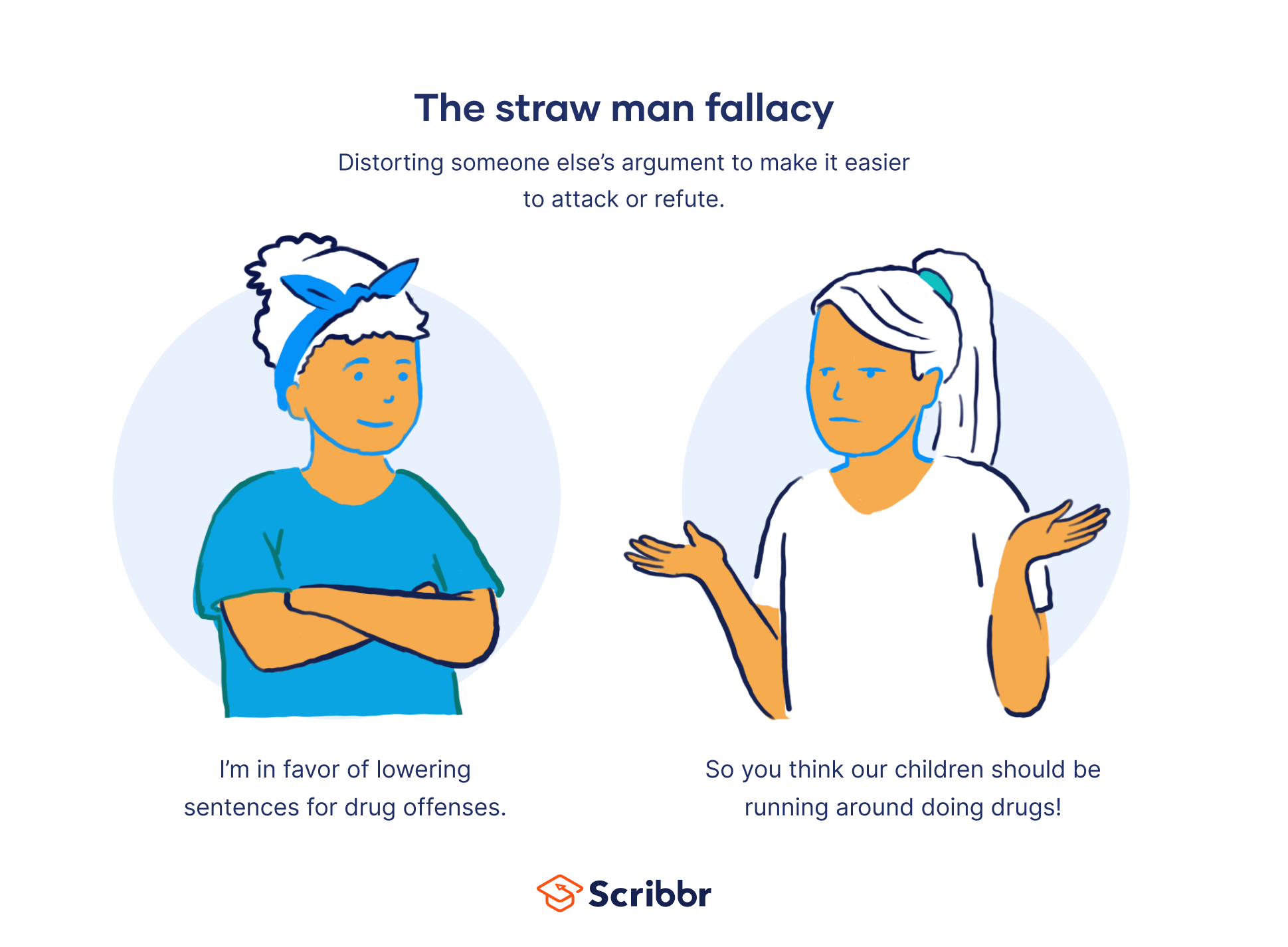
Non sequitur Fallacy:
-Means, “it does not follow.” This is an illogical statement, one that seems to draw a conclusion not supported by the premises.
-EX: My essay will get a good grade because I put a lot of effort into it.
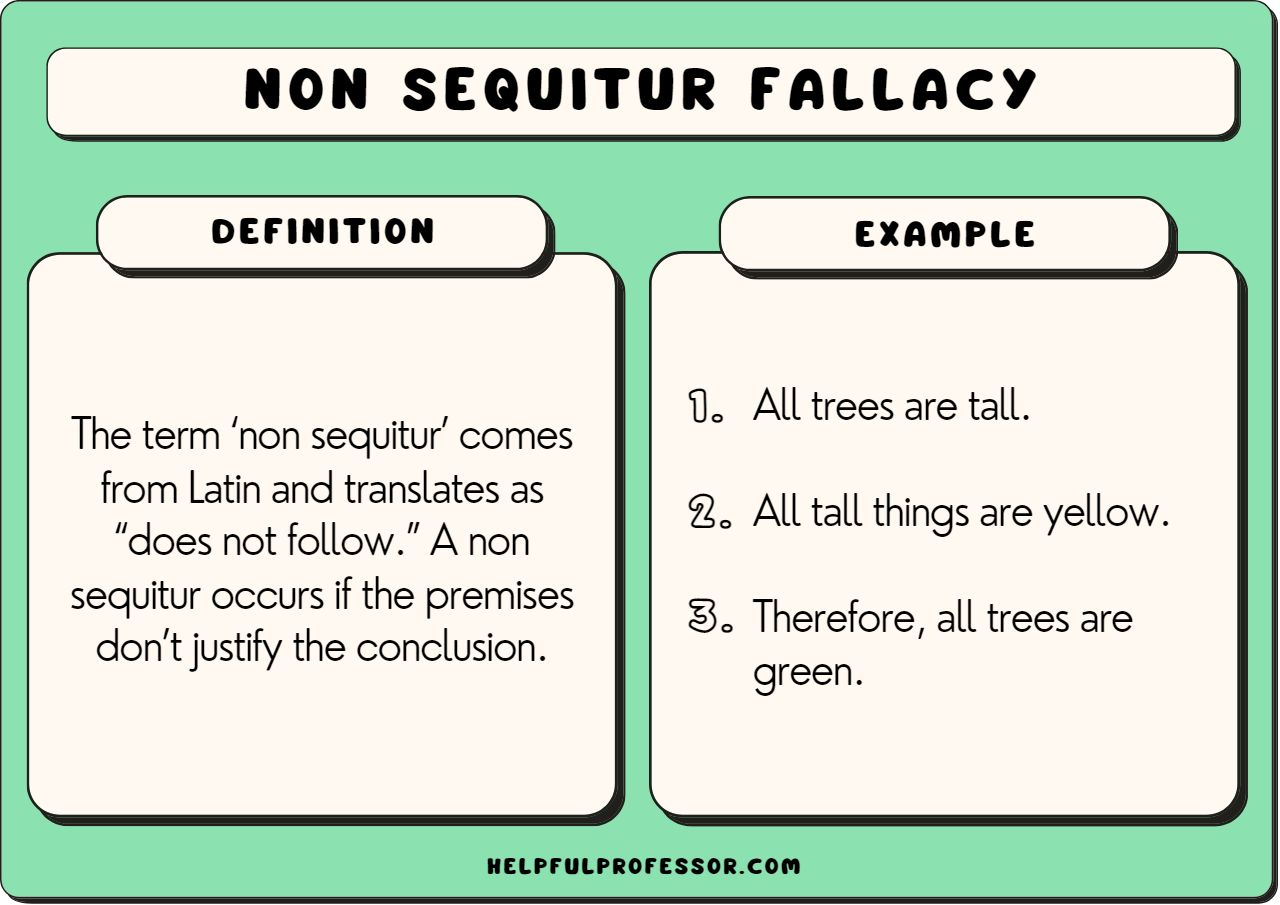
Ad Hominem Fallacy:
-An attack on one’s opponent’s character or personal traits instead of engaging with their argument.
-EX: After Sally presents an eloquent and compelling case for a more equitable taxation system, Sam asks the audience whether we should believe anything from a women who isn’t married, was once arrested, and smells a bit weird.
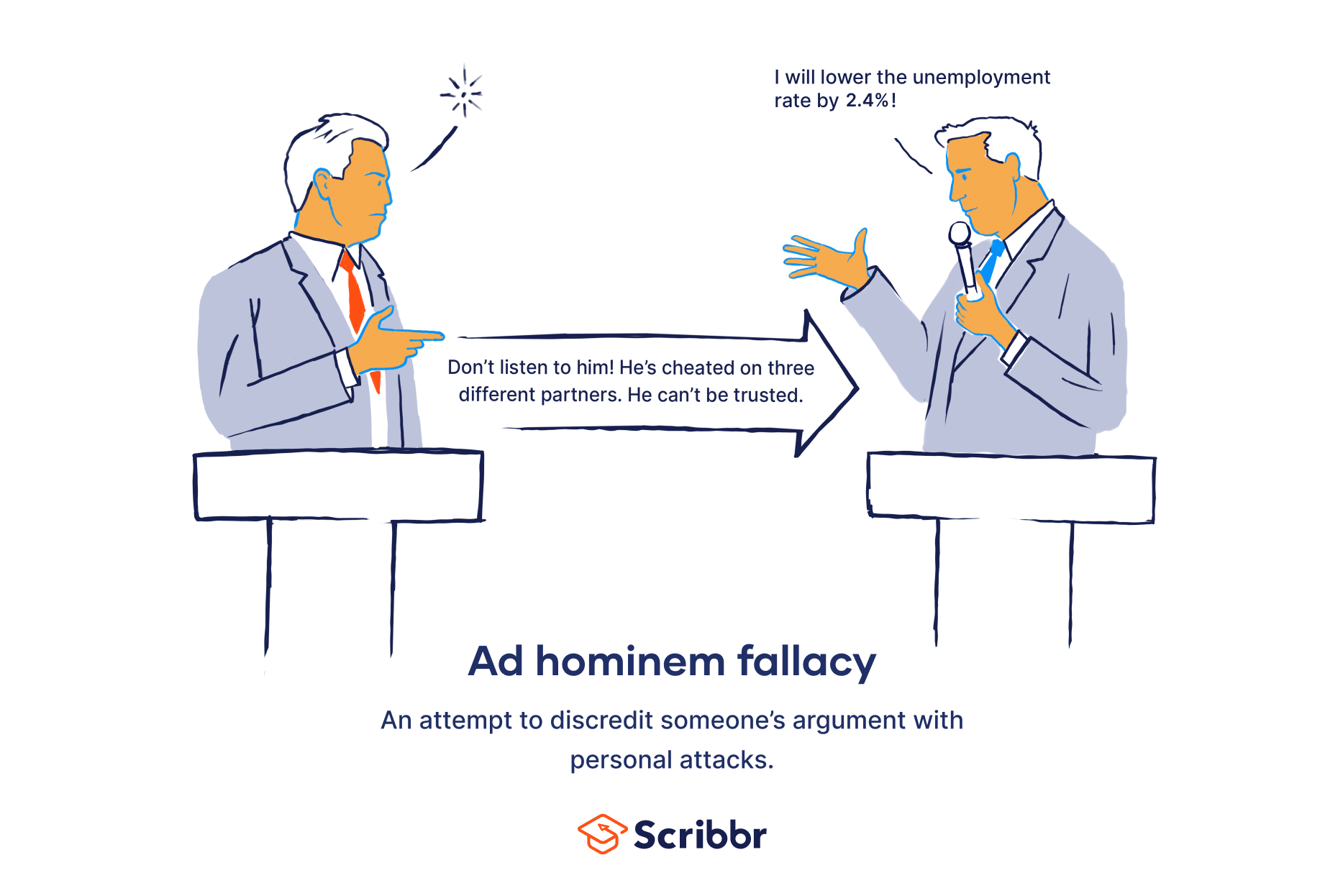
Appeal to authority Fallacy (argumentum ad verecundiam):
-Very popular in advertising; they depend on the substitution of a famous name for a serious argument.
-EX: Clarence tells his friends to trust his knowledge not for any reason other than the fact that he is a lawyer.
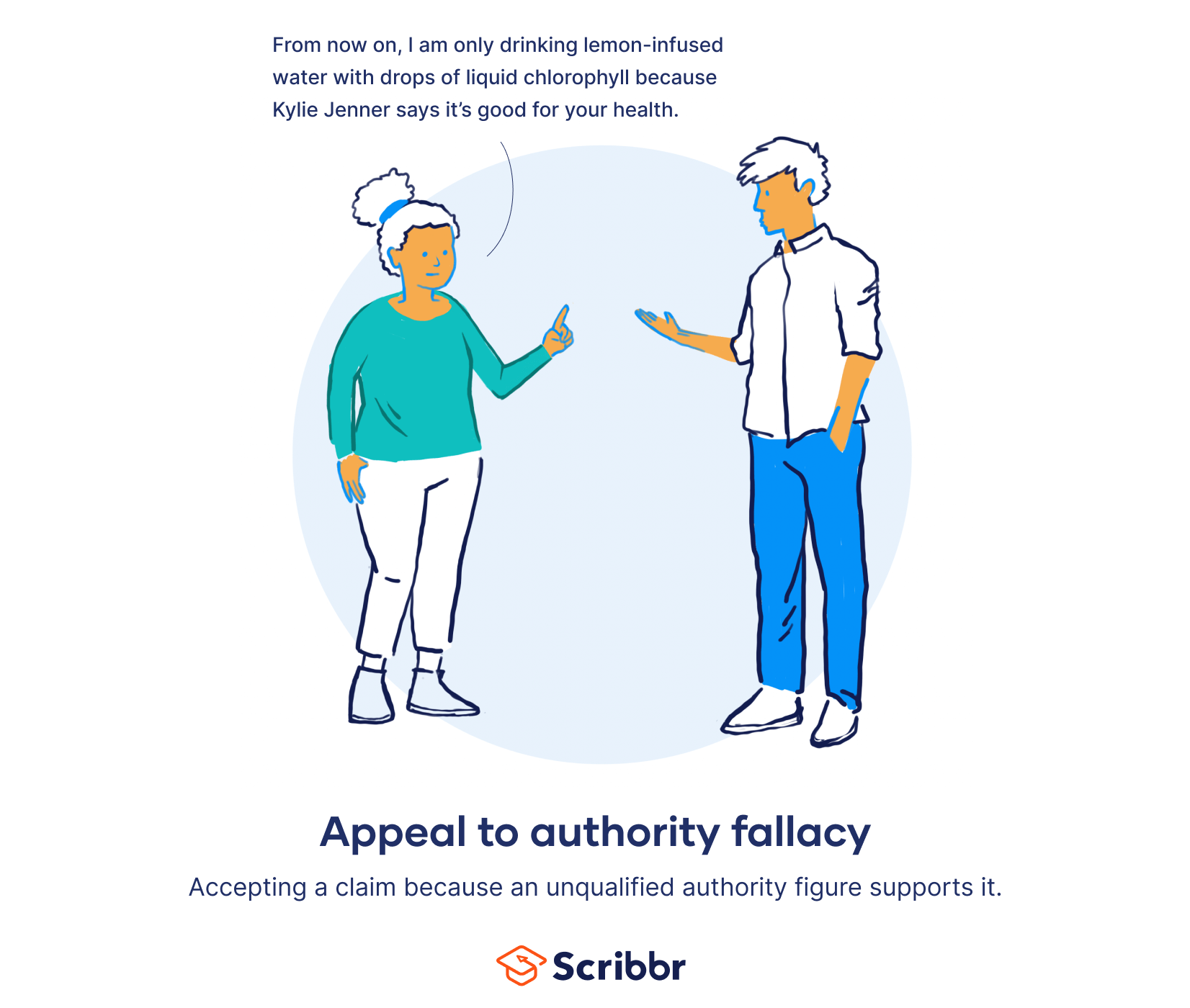
False analogy Fallacy:
-An assertion that because a similarity exists in one aspect, it must also exist in other aspects.
-EX: People who have to have a cup of coffee every morning before they can function have no less of a problem than alcoholics who have to have their alcohol each day to sustain them.
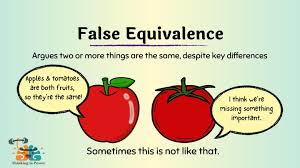
Argumentum ad populum Fallacy (bandwagon argument):
-You appealed to popularity or the fact that many people do something as an attempted form of validation.
-The flaw in this argument is that the popularity of an idea has absolutely no bearing on its validity.
-EX: Everyone drives over the speed limit, so it should not be against the law.

Begging the question Fallacy (Petiti principii)
-An argument where the conclusion is assumed in one of the premises. It is an attempt to prove something is true while simultaneously taking the same thing for granted. This line of reasoning is fallacious because the assumption is not justified by any evidence.
-EX: “Communism will never succeed, because a system in which everything is owned in common can never work.”
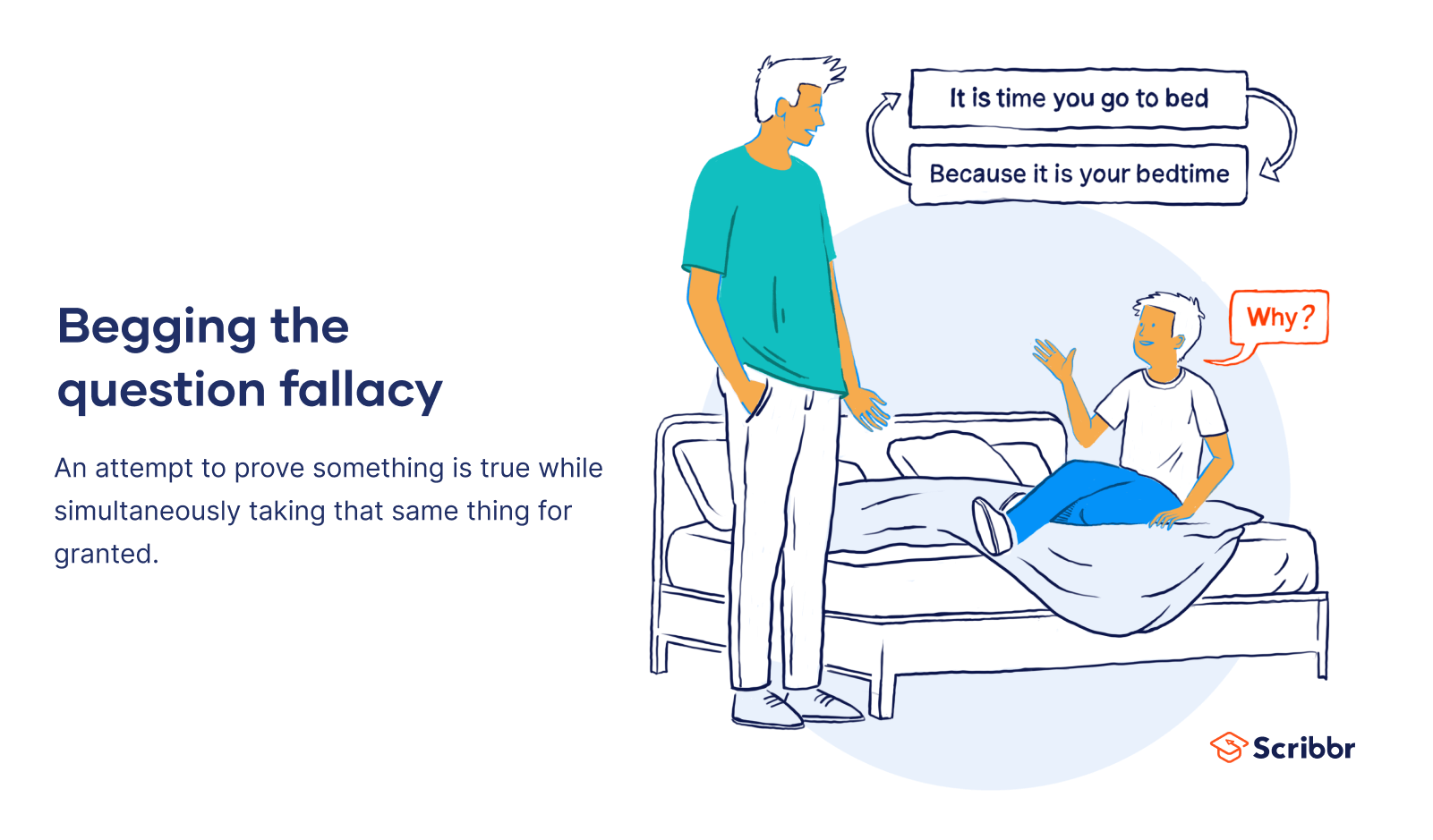
False dichotomy Fallacy (“Either…or” fallacy)
-This is the fallacies presentation of two possibilities as the only possibilities.
-EX: I must pass calculus, or my life will be ruined. Or “If the COVID vaccines work, then why are vaccinated people getting COVID?”
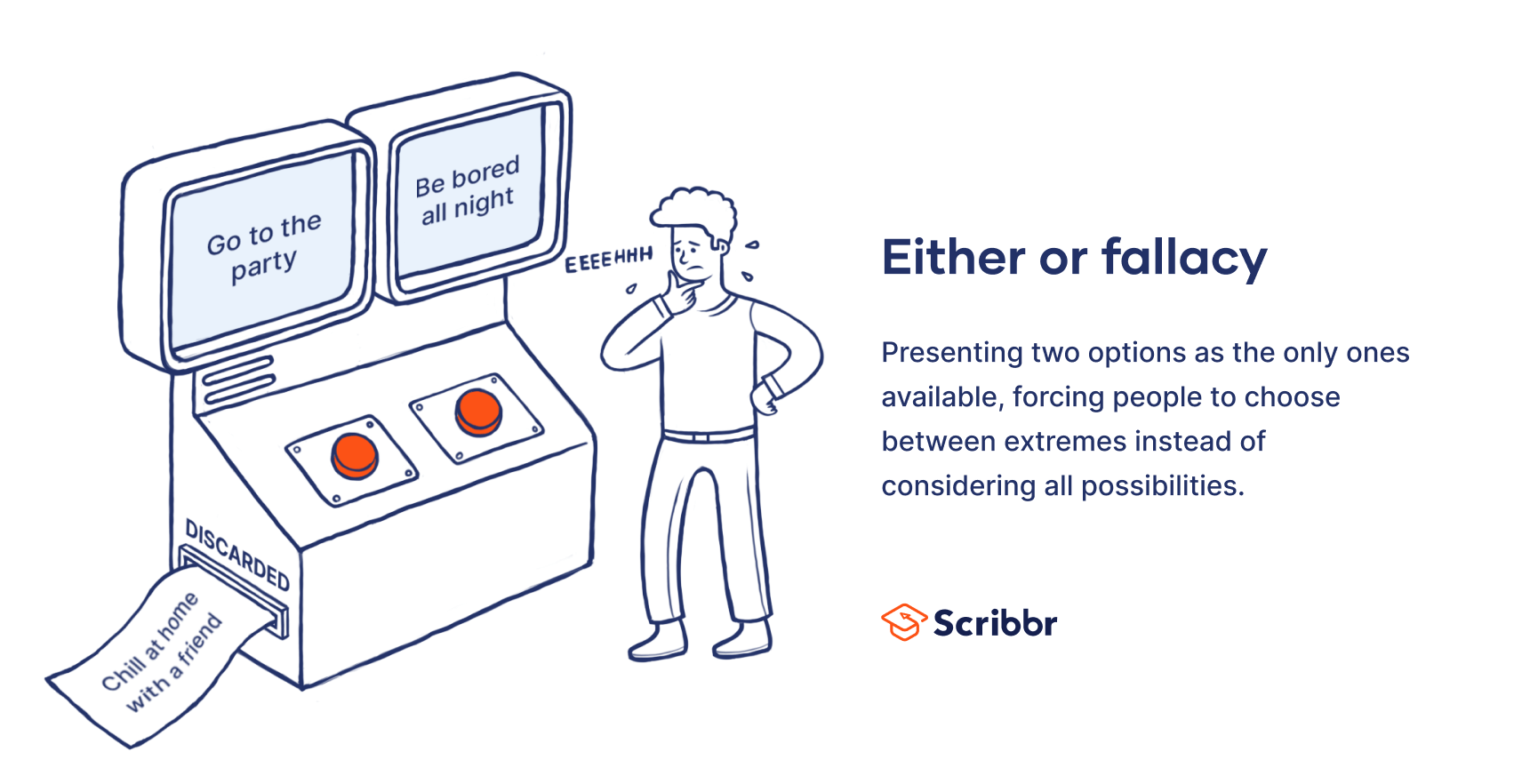
Hasty generalization Fallacy:
-Make poor arguments because they rely upon a nonexhaustive body of evidence.
-EX: Mary’s husband beats her; men always oppress women. Or my Italian brother-in-law makes superb pasta; all Italian men are great cooks.
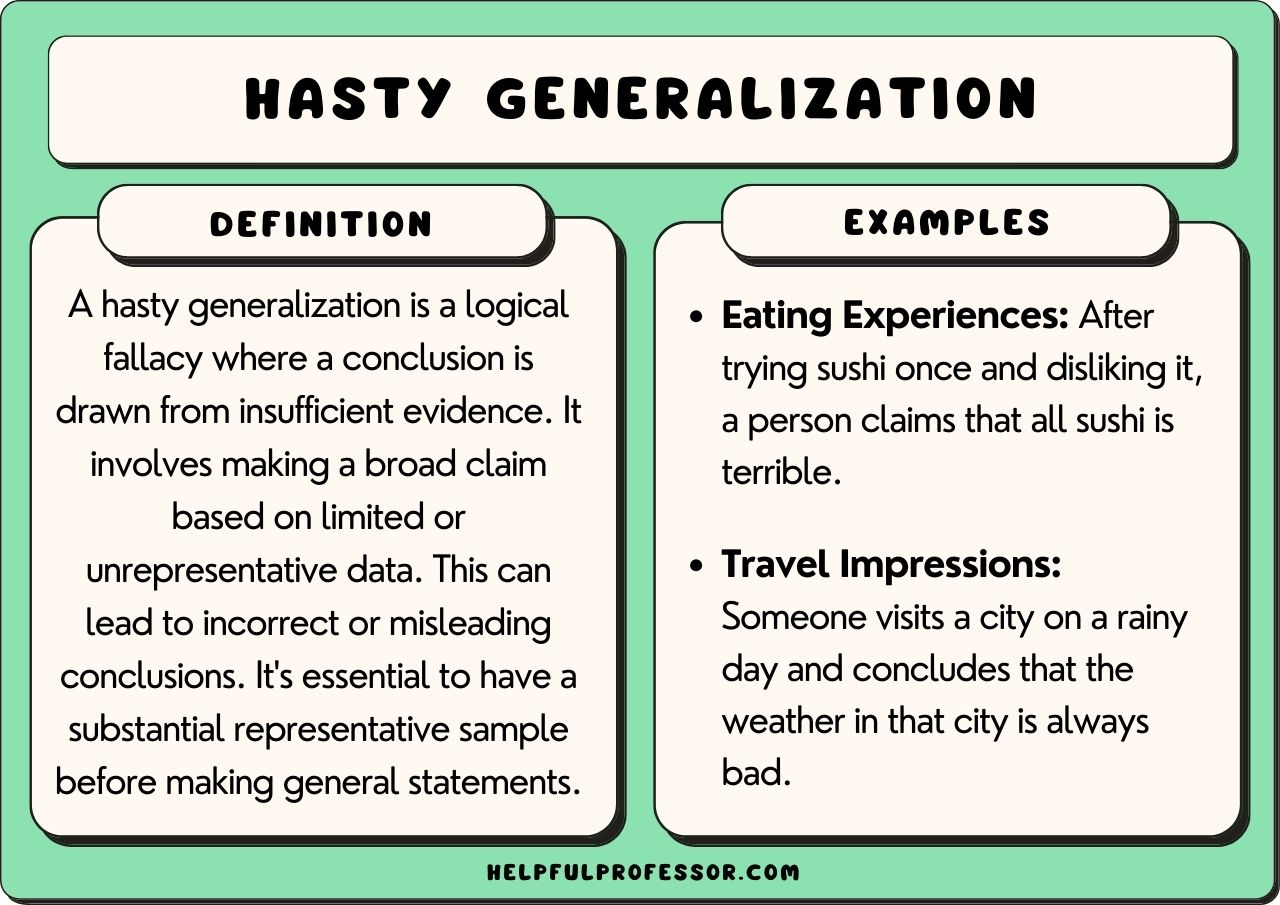
Reductio ad absurdum Fallacy:
-Involves the carrying of something or an idea to an absurd extreme.
-EX: If you count long enough, you will eventually run out of numbers to count. Therefore, counting is an activity that cannot go on forever.
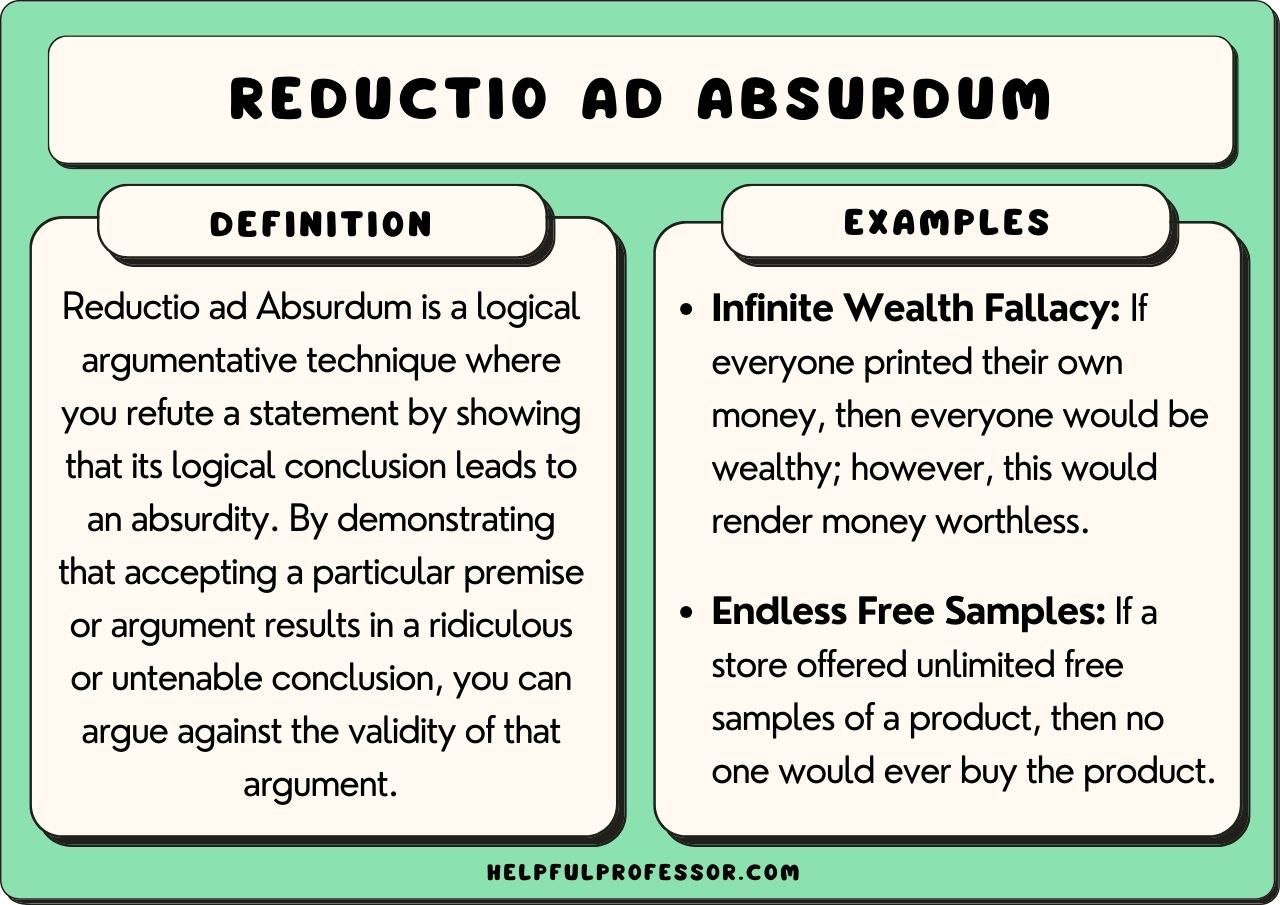
Red herring Fallacy:
-When irrelevant information is present alongside relevant information, it distracts attention from the relevant information.
-EX: Son: “Wow, Dad, it's really hard to make a living on my salary.” Dad: “Consider yourself lucky, son. Why, when I was your age, I only made $40 a week.”
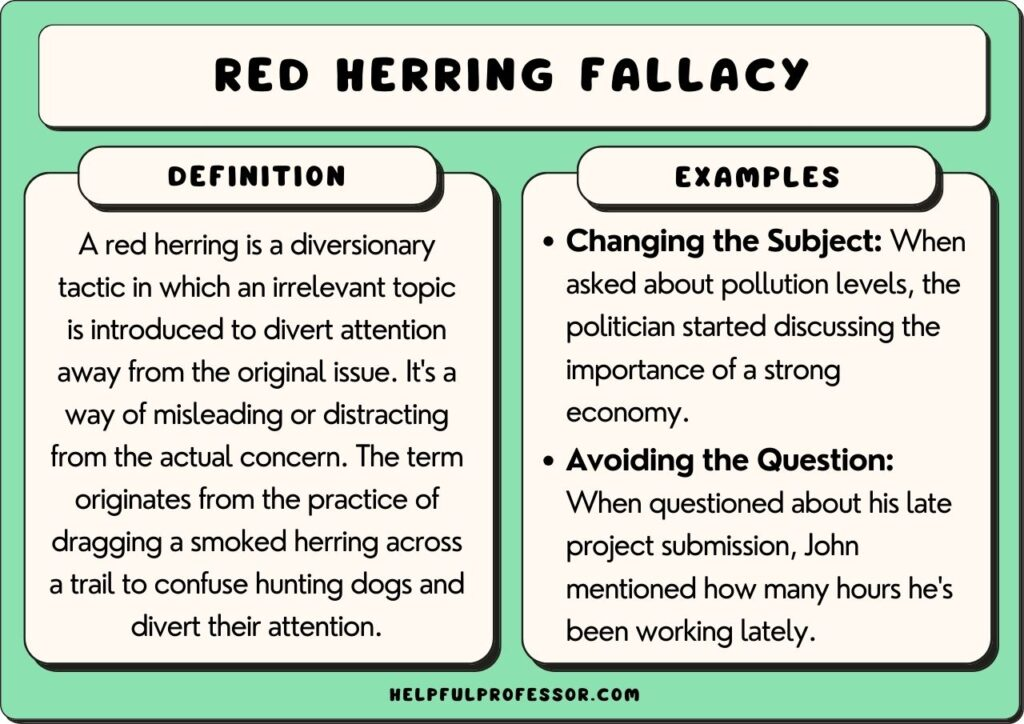
Argument from ignorance Fallacy (argumentum ad ignorantiam):
-Argument from ignorance that assumes because something has not been proven false, it is therefore true. Conversely, such an argument may assume that because something has not been proven true, it must therefore be false.
-EX: She has not said she doesn't like you, so she's probably interested. Call her up. OR you cannot prove God exists, so God does not exist.
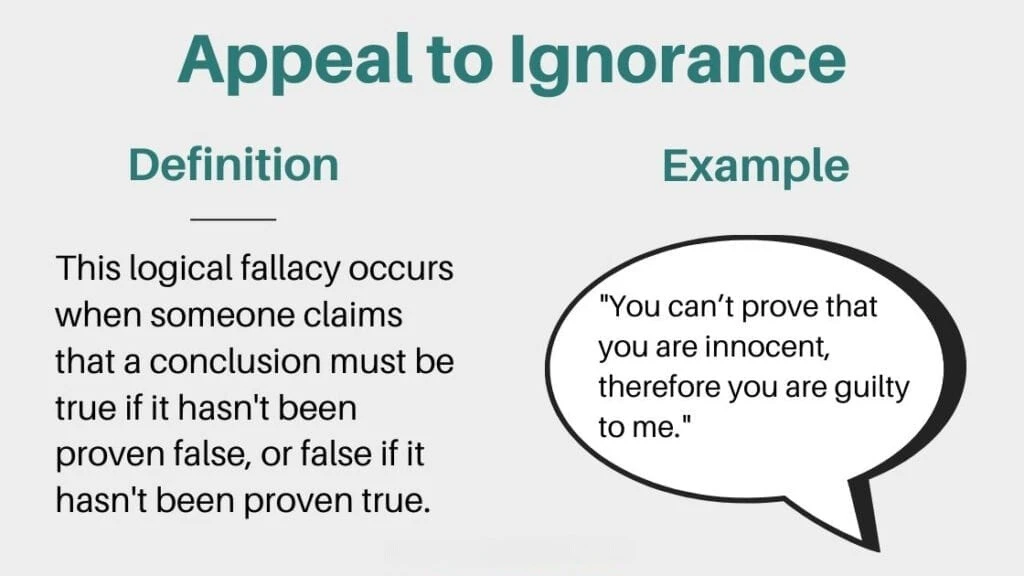
What is justice and what is at stake?
Justice is: The Quality of being impartial or fair. Administration of what is just by law. Fairness in the way people are treated. The reality of inequalities in the world is at stake.
Inequalities complicaticates the concept of justice, and what is the implication of this?:
-Global inequality is the unequal distribution of resources, opportunities, and power that shape well-being among the 8 billion individuals on our planet. An understanding of the concept of justice must consider the problem of injustice is the implication of this.
Forms of Injustice:
-Deliberatly imposed injustice.
-Injustice due to the accodent of birth.
-Injustice due to differences in Natural Abilities.
-Economic Injustice.
-Global Injustice.
Main questions raised about justice:
-Question of inequalities themselves: What kinds of causes of inequality are wrong?
-Main question about remedies is: What methods of interfering with the inequality are right?
Can equality be achieved in human society?:
-Fairness requires that opportunities should be opened to those who are qualified, and it is clearly a good thing when government try to enforce such equality of opportunity.
What is Philosophy?
Simple definition of philosophy: A reflective activity. Tries to put a spotlight on our thoughts, actions, and why we do what we do. Philosophy makes you care about humanity.
Word Definition: Philo–Love, Sophia–Wisdom, Philosophy = The love of wisdom.
The Value of Philosophy:
Critical thinking/reflection: not accepting information without asking ourselves questions first.
The pursuit of knowledge and curiosity: A philosopher does not accept information at face value. Seeks not simply knowledge but a deep understanding of wisdom.
Life-long learning: The study of philosophy can be truly enriching and highly gratifying, and it is excellent preparation for lifelong learning and enhances intellectual, political, and social existence.
Self-understanding: Philosophy is an activity people undertake when they seek to understand themselves, the world they live in, and the relations to the world and each other.
Communication Skills: Philosophy forces one to read, write, and think about big ideas. Helps you organize details.
Conspiracy Theory as an epistemological problem:
-Conspiratorial denial of truth as a problem of knowledge.
-Conspiracy theories are usually, but not necessarily, false, and they are mostly not based on good evidence.
-They are sometimes based on “evidence one finds out there” on the internet.
-Knowledge requires evidence that is supported by verifiable facts.
-Knowledge requires that our beliefs are based on truth.
-Knowledge requires that we have sound justification for the beliefs we uphold.
Why and how Conspiracy Theory as an epistemological problem thrives:
-People seek affirmation.
-Network of like-minded individuals.
-Denigration of traditional sources of authoritative knowledge.
False Flag conspiracy theories:
-The idea that various events and crises, such as terrorist attacks and mass shootings, were actually orchestrated by governments or sinister forces in furtherance of a political or social goal, such as gun control.
-A FFCT is thus a sub-type of conspiracy theory, alleging that some “...hostile or harmful action (such as an attack) was designed to look like it was perpetrated by someone other than the person or group responsible for it…”
-FFCTs usually align with the theorizer’s political ideology. Example: Holocaust denialism is embraced by people with antisemitic attitudes.
How philosophy can help solve this problem of conspiracy theories:
-Not accepting everything that is shared online as true without evidence.
-Knowing that there are bad actors on social media platforms.
-Accurate information over misinformation.
Anselm: The Ontological Argument 1:
-Holds that the idea of God in one’s mind is evidence of a genuine existing being.
-To know that God exsists, we must know his nature.
-The nature of God as a being than which nothing greater can be convinced.
-God alone cannot be conceived not to exist, anything else can be so conceived.
Criticism from a monk names Gaunilo:
-For Gaulino, saying that God exists in this way is similar to saying that a lost island exists.
St. Anselm’s response to Gaunilo:
-He argues that the idea of the lost island cannot be compared to the nature of God because something greater than a lost island can be conceived.
Thomas Aquinas – The Cosmological Argument 2:
-Famous for offering 5 arguments that can be used ot demonstrate the existence of God:
-The argument from motion (unmoved mover):
-Since everything that moves is moved by another, there must thereby exist an Unmoved Mover.
-God is the first mover, moved by no other.
-The argument from efficient cause:
-The sequence of causes which make up this universe must have a First Cause.
-If it is possible to go on ot infinity, there will be no first cause.
-Therefore, it is necessary to admit a first efficient cause, to which everyone gives the name of God.
-The argument to necessary being:
-He argues that since all existence things depend upon other things for their existence, there must exist at least one thing that is a Necessary Being - God.
-The argument from gradation:
-Since all existent things can be compared to such qualities as degrees of goodness, there must exist something that is an Absolutley Good Being.
-The argument from design:
-Also named “The Teleogical Argument” – The intricate design and order of existent things and natural processessnimply that a Great Designer exists.
William Paley – The Teleoogical Argument:
-English philosopher
-Best known for restating the argument from design for the existence of God.
-Teleological argument is also known as arguments form design.
-The experience of the order, design, and apparent purposefullness of the physical universe leads to the conclusion that there is a designer – God.
-2 parts to argument
-Comparing the watch to the world.
-Just as no one would claim that a watch came into existence by chance, no one should make such a claim about the natural world.
-The awesomeness of creation.
-Everyone has been deeply moved at one time or another by the order of natural processes.
-Someone (God) outside of nature programmed natural things to act as such
-EX: The scale of the universe with its stars and galaxies, the detailed beauty of a single flower or insect.
Blaise Pascal – The Wager:
-One of the most important scientific, philosophical, and religious figures of 17th century France.
-His position: No argument for God’s exsistence is satisfactory, and belief alone is necessary for religious life.
-Nonetheless, one must choose to believe or not. The option is unavoidable, and we are forces to wager.
-What are the alternatives: Either God exists, or he does not.
-If he does not exist, we lose nothing for believing that he does exist.
-If he does exist, however, we lose everything if we choose not to believe.
Soren Kierkegaard – Faith as the basis of belief, not logic:
-Danish philosopher and father of modern existentialism.
-He rejected the attempt to understand the nature of God through rational proofs.
-The knowledge of God’s existence is based on faith, not philosophical reasoning.
-Philosophical reasoning can only offer limited knowledge.
-Reason for Kierkegaard, bring God “as near as possible, and yet he is as far away as ever.”
-At the same time, faith in God is a profoundly personal matter.
-Kierkegaard does not reduce it to a kind of game of chance, as Pascal seems to.
-He stressed the subject, intuitive, emotional, and lived dimensions of religious faith.
How do we know the general principles of knowledge?:
-Rationalism & Empiricism
The Empiricism knowledge:
-British philosophers: Locke, Berkeley, and Hume
-They maintained that all-out knowledge is derived from experience (senses)
-Humans have 5 senses: touch, sight, hearing, smell, and taste
-The sensing organs associated with each sense help us understand and perceive the world around us.
The Rationists Knowledge:
-Continental philosophers: René Descartes, Gottfried Leibniz, and Spinoza
-They held the view that esteems reason as the primary source of knowledge (Intellect)
-Reality is not given to us through sensory qualities but through the mind.
-Knowledge gained through reason
-The view that reality itself has an inherently logical structure, and that a class of truth exists that can be grasped through the intellect directly.
-Rational knowledge entails the application of logic to human reasoning.
Who is Bertard Russel:
-One of the great historic controversies in philosophy is the controversy between the two schools of thought.
-Both Empiricists and Rationlists disagree on the description of the general principles of human knowledge.
The general principle of knowledge - Empiricism:
-Induction as a general principle of knowledge
-What is induction? A method of reasoning that moves from specific instances to a general conclusion. Also called inductive reasoning.
Problems of inductive reasoning:
-*General principle drawn from particular observations and could be mistaken.
-*It is not in all cases a general principle that follows from particular observations.
-*Induction is essential knowledge by experience (limited knowledge).
The general principle of knowledge - Rationalist position:
-The rationalists disagree with the empiricists:
-They argue that there are certain things we know that are independent of human experience.
-Rationalists believe that from general considerations as to what must be (abstract concepts), we can deduce the existence of everything else in the actual world.
Problems of rationalism:
-Can abstract ideas explain material facts?
-What if our ideas are ill-conceived?
-The rejection of skepticism
Why is philosophy important to public speaking?
-Philosophical ideas can be developed and weaved into communicative presentations with audiences in order to present thoughts that captivate the audience's attention.
-EX: The idea that people should do what makes them happy>>>> can be connected with the philosophical notion of hedonism
Philosophy is important to public speaking in 3 ways:
-The use of mental maps:
-Involves putting arguments in frames that allow people to detach themselves and think about a scenario or situation without it being overly abstract.
-The use of logical arguments:
-Logic and argument are essential skills for any effective speaker. Help you construct clear, coherent, and persuasive arguments that support claims and address your audience’s expectations and objections.
-Primary goal is persuasion, then you cannot do without logical argumentation.
-The application of critical thinking:
-Thinking about the content of your presentation. Before you can get on stage, you need to think about your presentation.
-Ask yourself what is the central question you are asking and answering.
Philosophy and Leadership:
-No leader can be successful without a leadership philosophy.
-Is essentially a belief system that guides your decision-making. Consists of your core principles, perspectives, and values.
How can philosophy make you a better leader?:
-The benefits of introspection and reflection on one's own character and beliefs.
-Philosophical reasoning, coupled with positive behavior changes.
-Philosophical self-reflection is essential at inflection points in one’s career, when a leader faces a serious challenge, dilemma, or crisis.
The S.A.N.E Method of leadership- David Brendel:
-Draws key questions posed by preeminent Western philosophers:
-Socrates: What is the most challenging question someone could ask me about my current approach/situation?
-Aristotle: What character virtues are most important to me, and how will I express them?
-Nietzsche: How will I direct my “ will to power”, manage my self-interests, and act in accordance with my chosen values?
-Existentialists: How will I take full responsibility for my choices and the outcome to which they lead?
SANE helps leaders clarify their world-views and goals in the face of challenges and transitions.
Why fake news is an Epistemological problem:
-Knowledge is justified true belief.
-Truth as correspondence between belief and fact- Russell
-Fake news can threaten knowledge by interfering with one or more of the truth, belief, and justification conditions on knowledge.
Moving beyond fake news: The role of the philosopher
-Truth-telling
-Distinguishing between truth and falsehood
-Critical thinking.
-Not accepting information at face-value.
-Knowing who to trust.
-Recognizing out limitations and avoid spreading misinformation.
-Media Literacy: checking your facts.
What is unique about Rini’s essay?
-The (individual) Epistemic virtue of partisanship
-A somewhat positive view of partisanship
Rini’s somewhat positive view of partisanship:
-Even though fake news is false and damaging, the testimonial practices propelling it are consistent with individual epistemic virtue.
-Some partisanship in testimony are individually reasonable
-Sometimes it makes sense to assign greater credibility to a testifier because you know you share a political affiliation with her.
Rini on Fake news and Epistemic trust:
-Trusting a testifier regarding political news requires trusting her judgments about political importance, and this means believing that she has, by and large, the right political values.
-Fake news can damage reliance on others for knowledge.
-“Fake news as a form of bent testimony”.